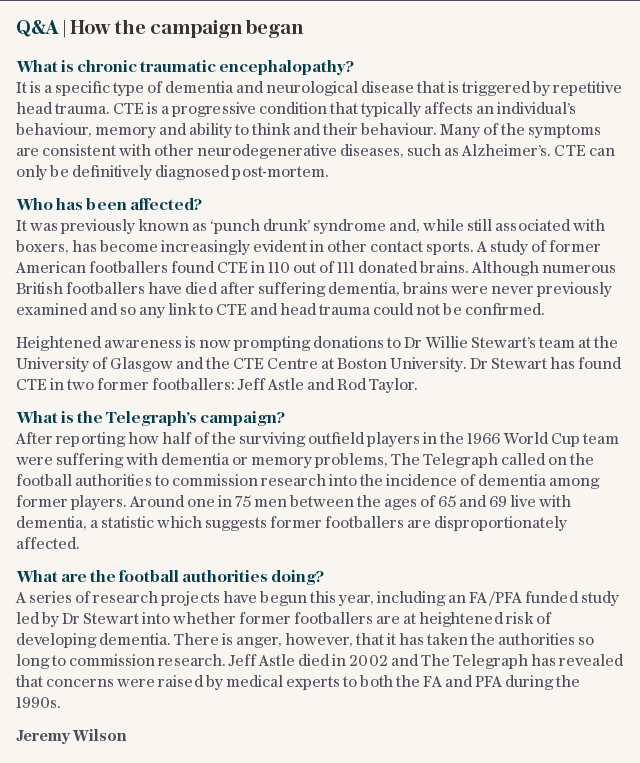Revealed: The second British footballer to die with head trauma

A second British footballer after former England striker Jeff Astle has been identified with the devastating brain disease chronic traumatic encephalopathy, The Telegraph can reveal.
Rod Taylor, a former wing-half for Portsmouth, Gillingham and Bournemouth, died in April and, after having his brain donated and examined by the neuropathologist Dr Willie Stewart in a similar way as Astle, it has been proved that he was suffering from dementia with Lewy bodies and CTE.
Lewy bodies, which typically impairs movement, judgment, sleep and can cause hallucinations, was linked only last week in new research to contact sports. CTE often affects memory and behaviour and can only be caused by head trauma.
The Taylor family were always convinced that his death was caused by repeated heading and collisions during a career in football that stretched from childhood through the professional game even to playing in non-league until the age of 50.
CTE was also identified at postmortem in the landmark Astle case and, with hundreds of NFL players in America having been diagnosed in recent years, football had been warned that these cases could represent the tip of an iceberg. An anonymous study last year by University College London also found CTE in four out of the six former footballer’s brains that were studied.
The Taylor family has now joined The Jeff Astle Foundation in calling for:
The football authorities and Government to formally recognise certain dementias among players as an industrial disease.
The Professional Footballers’ Association to put more resource into what is described as a “care crisis” among former players and their families.
Other families and players to consider brain donation to provide definitive answers and protect future generations.

The Astle Foundation has been contacted by around 400 families of former players who are suffering with different types of dementia, but a definitive CTE diagnosis can only be made after death. “Very few brains of footballers have been examined in this way and so this is a very significant development and represents irrefutable evidence of a link between playing football and dementia,” said Jeff’s daughter Dawn.
In an interview with The Telegraph, Rod’s widow Penny and daughter Rachel vividly described how players were exposed to head trauma.
“It was brutal,” said Penny. “They would chuck medicine balls at their heads in training to build their neck muscles up. He would be stitched up at half-time after collisions and was once unconscious on the pitch and they brought him back on.”

Dr Stewart, who is also leading the Football Association/PFA funded research into the incidence of dementia among footballers, has recently launched a brain donation programme at the University of Glasgow. “I cannot stress enough how important it is for us to investigate brains,” said Dr Stewart. “Patients like Rod and their families are crucial to our understanding of a complex issue and aid our chances of unlocking good therapy and treatments.”
The Taylor family donated Rod’s brain to help future players. He declined over the past decade to the point where he could no longer speak, swallow or recognise close family members. He was 74 when he died.
“It was a huge decision,” said Penny. “I talked it over with a friend and, in the end, she said, ‘What would Rod have done? Would he have wanted to help future players?’ We both knew the answer. After the horrors of recent weeks, it was a relief when Dr Stewart rang with the results and said: ‘There was nothing you or anybody could have done. Rod was in the end stages of dementia.'”
Dr Stewart found a combination of dementia with Lewy bodies and Grade Three CTE in his examination of Rod Taylor’s brain and has written to the coroner’s office in Bournemouth to suggest that these are added to the postmortem report as the cause of death.
The Taylor family and the Astle Foundation now want the football industry, with all its vast wealth, to recognise a link and provide adequate care for those families of former players who are dealing with dementia.
Faced with costs of £1,600 a week, the Taylors felt “absolutely desperate”. Rachel says that she found PFA deputy chief executive John Bramhall “evasive” on the subject of repetitive head injuries and CTE. “It felt like he didn’t want to have a conversation about it and didn’t want to take responsibility for anything.”
She said that the PFA did offer to fund respite care at £75 per week for six months and provided £5,000 towards the funeral. “We needed the support earlier,” she said. “The PFA is the union for those players. They should do the studies but, in the meantime, help the families more. It is an industrial injury. It’s an absolute scandal. You have got people dying and the PFA have bought Lowry paintings for the wall. It beggars belief.”

The PFA said that it was “extremely sorry to be informed of former member Rodney Taylor’s passing” and that its “thoughts remain with all of his family” and did not find the family's account of their interactions to be "a fair reflection of the support that has been provided".
A statement said that it was “committed to a duty of care” and that the PFA “wish to note that it has always responded positively to all the requests it received from Mr Taylor’s family”. The statement pointed to the grants it provides to members, access to independent welfare rights advisers and also outlined how they were involved currently in funding or supporting three different studies into dementia and football.

 Yahoo Sport
Yahoo Sport 





































